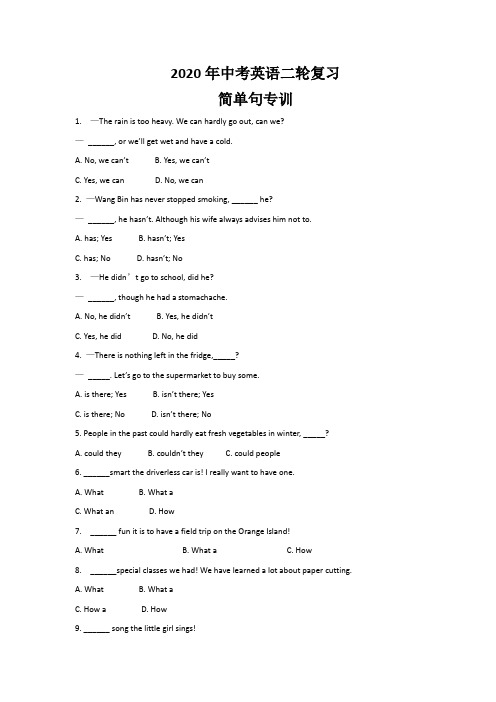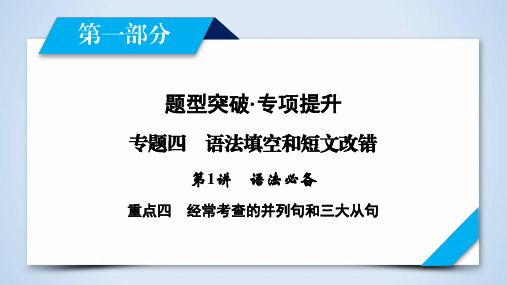2020届中考英语二轮复习《第1讲简单句并列句复合句》讲义-精校.doc
- 格式:doc
- 大小:153.19 KB
- 文档页数:12

中考英语语法专项复习:简单句、并列句和复合句句子按结构可分为简单句、并列句和复合句。
复合句中包含宾语从句、状语从句或定语从句等。
◆一简单句简单句就是只包含一个主谓结构的句子,其句式结构主要有五种:①主 + 谓。
He works in a big company. 他在一家大公司工作。
②主 + 系 + 表。
She is a kind girl. 她是一个善良的女孩。
③主 + 谓 + 宾。
Ann eats junk food twice a week .安一周吃两次垃圾食品。
④主 + 谓 + 间宾 + 直宾。
He gave me a pen .他给我一支钢笔。
⑤主 + 谓 + 宾 + 宾补。
He kept me waiting for two hours .他让我等了两小时。
◆二并列句并列句由两个或两个以上的简单句连接而成。
并列句中的各简单句同等重要,没有从属关系,是并列的关系,之间用并列连词连接。
1. 表示顺承的并列连词有and / not only …but (also)等。
如:She not only gaveus a lot of advice, butalso helped us to overcome difficulties .他不仅给了我们很多建议,而且还帮助我们克服困难。
2. 表示选择的并列连词有or,either …or …等。
如:Either you or Maria will haveto go .你或玛丽亚得去一趟。
3. 表示转折的并列连词有but,yet,however 等。
如:It is hot in summer here , butit’s not cold in winter .这里夏天热,但冬天不冷。
4. 表示因果关系的并列连词有so,如:He works hard , so he is one of the topstudents in our class .因为他学习努力,所以他是我们班最优秀的学生之一。



2020年中考英语二轮复习简单句专训1. —The rain is too heavy. We can hardly go out, can we?—______, or we’ll get wet and have a cold.A. No, we can’tB. Yes, we can’tC. Yes, we canD. No, we can2. —Wang Bin has never stopped smoking, ______ he?—______, he hasn’t. Although his wife always advises him not to.A. has; YesB. hasn’t; YesC. has; NoD. hasn’t; No3. —He didn’t go to school, did he?—______, though he had a stomachache.A. No, he didn’tB. Yes, he didn’tC. Yes, he didD. No, he did4. —There is nothing left in the fridge,_____?—_____. Let’s go to the supermarket to buy some.A. is there; YesB. isn’t there; YesC. is there; NoD. isn’t there; No5. People in the past could hardly eat fresh vegetables in winter, _____?A. could theyB. couldn’t theyC. could people6. ______smart the driverless car is! I really want to have one.A. WhatB. What aC. What anD. How7. ______ fun it is to have a field trip on the Orange Island!A. WhatB. What aC. How8. ______special classes we had! We have learned a lot about paper cutting.A. WhatB. What aC. How aD. How9. ______ song the little girl sings!A. What a sweetB. How a sweetC. What sweet10. ______exciting news it is! Beijing will hold the 2022 Winter Olympic Games.A. What anB. WhatC. HowD. How an11. —______hard-working boy Zhou Bin is!—Yes. I’m sure he’ll pass the test.A. What aB. WhatC. How12. —Lucy, look at the stars in the sky!—______!A. What bright it isB. How bright they areC. What bright they are13. _______ exciting news it is! 3D-printed houses will come out!A. WhatB. What anC. HowD. How an14. —All of my classmates have passed the PE test.—_______exciting the news is!A. WhatB. What anC. HowD. How an15. —Last summer holiday, I didn’t go anywhere. How boring!—_______. But I’m going somewhere for a holiday this summer.A. Neither I didB. Neither did IC. So did ID. So I did16. —More and more people prefer to walk rather than ride in cars.—_______. Walking is good for health.A. So they areB. So are theyC. So they doD. So do they17. —Peter has made great progress in English recently.—_____. He has been studying so hard these days.A. So have heB. So he hasC. So he haveD. So has he复合句专训1. Grace wonders ______she should do next.A. howB. whatC. that2. —I am worried about ______ I can enter a good high school or not. —Take it easy. Believe in yourself!A. thatB. whenC. whetherD. where3. I wonder ______ Tom had a good time having a picnic yesterday.A. thatB. ifC. whatD. which4. —I wonder ______ the students have a physical examination. —Once a year.A. how farB. how soonC. how longD. how often5. —Could you please tell me ______ I can buy some stamps? —Yes. There is a post office on Center Street.A. whyB. whereC. when6. We don’t know _____, but it tells us the importance of friendship.A. what the story is aboutB. whether the story is trueC. when did the story take place7. —Have you decided _____the Expo 2019 Beijing?—This summer holiday.A. how are you going toB. how you are going toC. when are you going toD. when you are going to8. Rose is wondering _____.A. what is Matt doingB. where has Jason goneC. when will Aaron leaveD. who did the washing9. Life is like a story. What matters is not how long it is but_____.A. how good it isB. how good is itC. what good it is10. —I wonder _____.—Someone who can make me a better person.A. when you often meet your friendsB. how you make your friends happyC. who you want to make friends withD. where you spend weekends with friends11. —Could you tell me _____ tomorrow?—It will be sunny.A. what will the weather be likeB. what the weather will be likeC. when will the weather be sunnyD. when the weather will be sunny12. —Could you please tell me _____ ?—Sure. On Friday afternoon.A. where the book sale isB. when the book sale isC. what the book sale is about13. —Could you tell me ______for the fruit?—By paying over the Internet.A. how much will I payB. how much I will payC. how will I payD. how I will pay14. —Dear friends, do you still remember ______ three years ago? —To realize our dreams!A. why you came hereB. why did you come hereC. how you came hereD. how did you come here15. —Your dress looks nice on you. Could you please tell me______? —In Taobao.A. where did you buy itB. when you bought itC. where you bought itD. when did you buy it16. —Do you mind telling me_____?—Of course not. Remember “Keep Moving”.A. how can I lose weightB. where can I lose weightC. how I can lose weightD. where I can lose weight17. —Did you notice _____in her office?—Yes. She was going over our writing.A. what was Miss Lin doingB. what Miss Lin was doingC. what does Miss Lin doD. what Miss Lin does18. —Could you please tell me ______the Nanhu Square?—Yes, of course. You can either ride a sharing bike or take a bus.A. when can I get toB. why can I get toC. where I can get toD. how I can get to19. Du Fuguo is a hero ______is known to millions of Chinese people.A. whoB. whichC. what20. The movie ______ I have seen twice is The Wandering Earth.A. whoB. whichC. whereD. when21. Not all children ______ watch this video will become a scientist, but some may become interested in science.A. whomB. whichC. whoD. whose22. China is getting better at making hi-tech products _______ can be bought in all parts of the world.A. whoB. whichC. what23. —The boy _______ lost is crying there.—How do you know he gets lost?A. whoseB. whoC. who’s24. —Do you like the weekly talk show The Readers on CCTV?—Sure. It’s a great TV program _______ can develop the habit of reading.A. whoB. thatC. whatD. whose25. —Have you seen the film The Wandering Earth (《流浪地球》)?—Yes. It’s the best one _______I have ever seen.A. thatB. whichC. whatD.it26. —What are you looking for?—I’m looking for the storybook _______ you lent to me last week.A. whoB. whichC. when27. —Frank, look! Who are the children under the tree ______waiting in a line.—They are the students from No.1 Primary School.A. that areB. where areC. which isD. who is28. —Do you know the man ______ spoke at the meeting just now?—No, I don’t know.A. whatB. whoC. whichD. whose29. —Tomorrow is Father’s Day. What’s your surprise for your father?—The first thing_______ I will do is to make a card for him.A. whoB. whereC. whoseD. that30. Anyone who is a server or _______ has been one knows that customers always come first.A. whomB. whatC. whoD. which31. —Qingdao is the most beautiful city ______ I’ve ever been to.—So it is. Many international meetings are held there every year.A. thatB. whichC. what32. —Class, you should be thankful to those people ______ helped and supported you.—We will, Miss Chen.A. whichB. whomC. whoD. whose参考答案简单句专训1.A2.C3.C4.C5.A6.D7.A8.A9.A 10.B 11.A 12.B 13.A 14.C 15.B 16.C 17.D复合句专训1.B2.C3.B4.D5.B6.B7.D8.D9.A 10.C 11.B 12.B 13.D 14.A 15.C 16.C 17.B 18.D 19.A 20.B 21.C 22.B 23.C 24.B 25.A 26.B 27.A 28.B 29.D 30.C 31.A 32.C。


简单句、并列句、复合句【知识点睛】 一、句子分类____________(____________________________)____________________________________________(_____________________)⎧⎧⎪⎪⎪⎪⎨⎪⎪⎪⎪⎩⎨⎪⎧⎪⎪⎪⎨⎪⎪⎩⎩ 、、、 按分 句子按分 、、 二、陈述句、疑问句、祈使句、感叹句 陈述句:用于说明事实或说话人的看法 疑问句:用于提问祈使句:用于表示请求、命令、劝告、建议等 感叹句:用于表达强烈的感情(一)陈述句有肯定和否定两种形式,多以句号结尾,读降调。
陈述句的否定式:1. be 的否定式(be 作系动词和助动词)2. 助动词、情态动词的否定式3. 除not 外,其他否定词也可以构成否定句 1) 用no 表示,no = not any/a2) never 从不,决不,永不 seldom 很少 hardly 几乎不 3) little, few 几乎没有 4) no one/nobody 没有人 5) nothing 什么也没有6) neither of…没有什么(两者都不);none of…没有任何,什么都没有(三者或三者以上都不) 7) too…to…太……以至于不能……(二)疑问句 1. 一般疑问句(1)用什么词提问,用什么词回答。
—Are you a student? 你是一个学生吗?—Yes, I am. 是的,我是。
/—No, I ’m not. 不,我不是。
(2)否定的一般疑问句往往表示惊讶、赞叹、怀疑等语气。
(注意yes/no 的翻译) —Don’t you watch TV at night? 你晚上不看电视吗?—Yes, I do. 不,我看电视。
/—No , I don’t. 是的,我不看电视。
(3)用其他词语代替yes/no ,使语气更客气、委婉。
—Can you go to the movies with me? 你能和我一起去看电影吗?—I’m afraid not. I have much homework to do. 恐怕不行,我有很多作业要做。
简单句、并列句、复合句【知识点睛】 一、句子分类____________(____________________________)____________________________________________(_____________________)⎧⎧⎪⎪⎪⎪⎨⎪⎪⎪⎪⎩⎨⎪⎧⎪⎪⎪⎨⎪⎪⎩⎩ 、、、 按分 句子按分 、、 二、陈述句、疑问句、祈使句、感叹句 陈述句:用于说明事实或说话人的看法 疑问句:用于提问祈使句:用于表示请求、命令、劝告、建议等 感叹句:用于表达强烈的感情(一)陈述句有肯定和否定两种形式,多以句号结尾,读降调。
陈述句的否定式:1. be 的否定式(be 作系动词和助动词)2. 助动词、情态动词的否定式3. 除not 外,其他否定词也可以构成否定句 1) 用no 表示,no = not any/a2) never 从不,决不,永不 seldom 很少 hardly 几乎不 3) little, few 几乎没有 4) no one/nobody 没有人 5) nothing 什么也没有6) neither of…没有什么(两者都不);none of…没有任何,什么都没有(三者或三者以上都不) 7) too…to…太……以至于不能……(二)疑问句 1. 一般疑问句(1)用什么词提问,用什么词回答。
—Are you a student? 你是一个学生吗?—Yes, I am. 是的,我是。
/—No, I ’m not. 不,我不是。
(2)否定的一般疑问句往往表示惊讶、赞叹、怀疑等语气。
(注意yes/no 的翻译) —Don’t you watch TV at night? 你晚上不看电视吗?—Yes, I do. 不,我看电视。
/—No , I don’t. 是的,我不看电视。
(3)用其他词语代替yes/no ,使语气更客气、委婉。
—Can you go to the movies with me? 你能和我一起去看电影吗?—I’m afraid not. I have much homework to do. 恐怕不行,我有很多作业要做。
2. 特殊疑问句用特殊疑问词来引导,不用________回答。
特殊疑问词包括疑问代词、疑问副词和疑问词组。
(1)疑问代词:what, who, which, whose, whom(2)疑问副词:when, where, why, how(对状语进行提问)(3)疑问词组:how soon, how long, how far, how often等(4)否定的特殊疑问句一般有劝告、建议、责备等意味。
Why don’t you come here?= Why not come here?3. 选择疑问句提出两种或以上的情况要对方选择,不能用________回答,要用完整的句子或其省略形式。
(1)一般选择疑问句句式—Do you like tea or coffee?—I like tea.(2)特殊选择疑问句句式—Which do you like better, tea or coffee?—I prefer tea.4. 反意疑问句(1)结构:“陈述部分,简短问句?”(2)原则:_______________,______________(3)三步走:第1步将陈述部分变成一般疑问句第2步提取“助动词(或be动词)+主语”,当主语为名词时,要变为代词第3步前肯后否,前否后肯(能缩就缩)(4)回答:实事求是【翻译】——Lucy从不早起,是吗?——是的,她从不早起。
/不,她有时候早起。
__________________________________________________________________________________________________________________________(三)祈使句特征:以____________开头,省略第二人称主语_______;若要表示礼貌,可以加上语气词___________。
肯定式否定式特殊式Stand up! Don’t stand up! No smoking/parking!Be quiet! Don’t be noisy! No photos!Let him in! Don’t let him in!(四)感叹句感叹句是用来表达人的特殊感情的句子,可以表达人的喜、怒、哀、乐等感情色彩。
感叹句可以是一个单词、一个不定式、一个由短语构成的独立句,也可以是由what或how引导的句子,句末常用“!”。
Great!A good job!_______________________________What a good day (it is)!What terrible weather (it is)!What smart students (they are)!_______________________________How terrible (the weather is)!How smart (the students are)!How fast he runs!【填空】___________ tall the boy is!___________ lovely children!___________ useful book it is!___________ exciting news!三、简单句、并列句、复合句简单句:由一个主语(或并列主语)和一个谓语(或并列谓语)构成的句子。
I am a student.Lily and Lucy are twins.He went up to the door, opened it and entered.She will go there either this week or next week.并列句:由并列连词(and, so, but, or等)把两个或以上的简单句连在一起构成的句子。
He did the work and he did it well.I like music, but I don’t like this song.Either you leave, or Tom leaves.复合句:由一个主句和一个或一个以上的从句构成的句子。
Do you know where my bike is?John fell asleep while he was listening to the music.That is the woman I met yesterday.(一)常见句子成分主语:句子所要说的人或物;通常由名词或代词担任谓语:说明主语的动作或状态;由主动词充当宾语:及物动词或介词的对象或结果;通常由名词或代词担任表语:在系动词后,表明主语身份或特征;通常由名词、代词、形容词充当定语:修饰名词或代词;通常由形容词、代词、数词担任状语:修饰动词、形容词、副词;通常由副词、介词短语担任宾语补足语:说明宾语怎么样或干什么;常由形容词、动词担任同位语:通常紧跟在名词、代词后,进一步说明它的情况(二)简单句五大基本句型主系表 / 主谓(vi.) / 主谓(vt.)宾 / 主谓(vt.)宾宾 / 主谓(vt.)宾宾补(三)连词___________________________________________________________________________________________________________⎧⇒⎧⎪⎪⎧⎪⎪⎪⎪⎪⎨⎪⎪⇒⎨⎪⎪⎪⎪⎨⎪⎪⎩⎩⎪⎪⎧⎪⎪⎪⇒⎨⎪⎪⎩⎩连接词与词或短语与短语表表连接简单句与简单句表连词表连接主句与从句 四、三大从句 (一)宾语从句含义:在主从复合句中充当宾语的句子。
We know Jack is a lazy student.We are talking about whether it’s a cat . He is unhappy that he didn ’t pass the exam.分类:动词后宾语从句、介词后宾语从句、形容词后宾语从句 三要素:________、________、________【难点1】只用连接词whether 的情况I’m thinking about __________ I should see the film. I haven’t decided __________ to go to the cinema.I’m not sure __________ or not it’s worth seeing the film. 结论:________________________________________【难点2】特殊疑问句本身语序为陈述语序的句子 Who broke the window?What happened last night?What ’s the matter/the trouble?What ’s up/wrong?When will we meet?【难点3】宾语从句和简单句的转换I don’t know what I can/should do next. = I don’t know what to do next.He couldn’t decide which one he could/should buy. = He couldn’t decide which one to buy. Could you tell me how I can get to the zoo? = Could you tell me _________________________? 连接词 _______ (可省略) _______________ _______________ 宾语从句:陈述句 宾语从句:一般疑问句 宾语从句:特殊疑问句语序_________语序 时态 Miss Li said that the earth ________ (be) round._______________ _______________ ______________________________ _______________ _______________结论:1. 当主句的________与从句的________一致时,且主句的谓语动词是know, decide, learn等时,此复合句可转换成简单句,即从句部分改为“特殊疑问词+不定式”结构。
2. 当主句谓语是ask, tell, show, teach等________动词时,且主句的______________和从句的________一致时,此复合句可转换成简单句,即从句部分改为“特殊疑问词+不定式”结构。